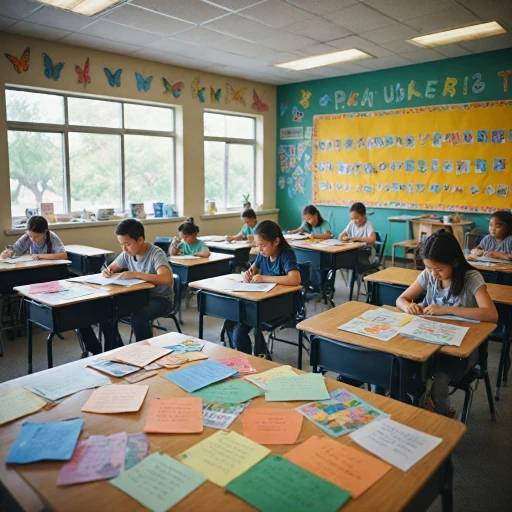
The Importance of Thank You Cards for Teachers
Expressing Gratitude through Cards
Acknowledging the dedication and efforts of teachers is essential, as it reinforces the invaluable role they play in shaping young minds. A simple yet impactful way to convey this gratitude is through thank you cards. These cards provide a tangible expression of appreciation, reinforcing the bond between students and educators. Choosing the right card and message can make all the difference. Whether it’s a card for teacher appreciation week or a heartfelt end of the year thank you, it’s vital to reflect sincerity in your words. Incorporating student input and creativity into the card can add a special touch. Hand-drawn art or personalized notes from the class can transform a basic greeting card into a cherished keepsake. For instance, a message might read: "Thank you for being such a patient and inspiring teacher throughout the year. Your positivity and commitment have meant so much to us all. We are grateful for every day we spent learning in your classroom." For those seeking additional guidance on writing and crafting thoughtful notes, explore more here. This can provide further insights into expressing appreciation effectively and meaningfully.Elements of a Thoughtful Thank You Card
Crafting a Meaningful Message
When creating a thank you card for a teacher, the message inside is the heart of your appreciation. A thoughtful thank you card should convey genuine gratitude and acknowledge the teacher's unique contributions to your or your child's educational journey. Here are some key elements to consider:
- Personalization: Address the teacher by name and mention specific instances where their efforts made a difference. This personal touch shows that the card is not just a generic gesture but a sincere expression of thanks.
- Specificity: Highlight particular actions or qualities that you appreciate. Whether it was their patience during a challenging topic or their creativity in making lessons engaging, specific examples make your message more impactful.
- Emotion: Express how the teacher's efforts have positively affected you or your child. Sharing your feelings can make the message more heartfelt and memorable.
- Gratitude: Clearly state your appreciation. Phrases like "Thank you for your dedication" or "I am grateful for your support" can effectively convey your sentiments.
For more creative ways to express your gratitude, consider exploring crafting clever thank you puns to add a touch of humor and uniqueness to your card.
Example of a Heartfelt Message
"Dear [Teacher's Name],
Thank you for your unwavering dedication and support throughout the year. Your passion for teaching and your ability to make each day in class exciting have truly inspired me. I am especially grateful for the extra time you spent helping me understand [specific topic]. Your patience and encouragement have made a significant impact on my learning experience. Thank you for being such an amazing teacher!"
Incorporating these elements into your thank you card can transform a simple note into a meaningful gesture of appreciation that teachers will cherish.
Creative Ideas for Designing Thank You Cards
Innovative Ways to Make Thank You Cards Stand Out
In the hands of any creative mind, a simple card can transform into a heartfelt gift. There are many creative ideas for designing thank you cards, from using premium materials to infusing a bit of DIY charm. These ideas can elevate your expressions of appreciation and make your message to teachers on their special day even more memorable.- Use Quality Materials: Premium paper or recycled materials can turn a basic thank you card into something special. By opting for textured card stock, metallic finishes, or eco-friendly products, you not only show appreciation but also care for the environment.
- DIY Touches: Kids in class can get involved by adding their personal touches. From drawing cute teacher-portraits to stickers, these simple decorations can turn a regular day into a cherished memory for the recipient.
- Personalized Designs: Incorporate elements familiar to the teacher, like favorite quotes, subject motifs, or school events. You could include a collage of photos from the school year, creating a heartfelt narrative.
- Interactive Cards: Make your cards teacher-friendly with interactive elements like pop-ups or slide-outs. Such features can surprise and delight, making the day of appreciation genuinely special.
- Incorporate Student Input: Invite students to write a line or draw on the card. Not only does this involve kids, but it also makes the thank card a collaborative piece, reflecting both the teacher's and students' shared journey.
Examples of Heartfelt Messages for Teachers
Touching Messages to Show Your Appreciation
When expressing gratitude to teachers through a thank you card, crafting a heartfelt message is key. A well-thought-out message can make teachers feel valued and appreciated for their dedication and hard work. Here are some elements and examples to consider:- Express Specific Gratitude: Highlight specific actions or qualities that made a positive impact on your child’s education. For example, “Thank you for staying after school to help [name] with math. Your patience and dedication have truly made a difference.”
- Acknowledge Their Efforts: Teachers often go beyond the scope of their duties. Recognize their efforts by adding something like, “Your endless passion for teaching in our class has inspired my child to pursue subjects with enthusiasm. We appreciate the extra time you take to make each lesson engaging.”
- Personal Connection: Share a personal anecdote to strengthen the connection. For instance, “The science project displayed during the last parents’ day was a testament to your innovative teaching methods. My child hasn’t stopped talking about it!”
- Homage to Their Role: Use wording that acknowledges their essential role in a student's development. Such as, “You’re more than a teacher; you’re a guiding figure in my child’s academic journey. We’ll always be grateful for your wisdom.”
Incorporating Student Input in Thank You Cards
Getting Students Involved in Appreciation Cards
Engaging students in the process of creating thank you cards can be a rewarding experience for both the children and their educators. Involving students not only enriches the card-making activity but also instills a deeper sense of gratitude in young learners. Here's how student input can enhance the process:
- Personalized Messages: Encourage each student to write a personal thank you note. This helps the teacher realize the unique impact they have on each individual.
- Artwork Contribution: Students can contribute drawings or doodles, making each card a unique piece of art. DIY teacher cards with kids’ drawings are cherished keepsakes.
- Class Contributions: Consider gathering a collective message from the class, compiling thoughts and thanks into a cohesive greeting card.
An example of a heartfelt message could be a student saying, "Thank you for making math fun and exciting every day! I've learned so much this year." This personalized touch radiates genuine appreciation, staying with the teacher long after the school year ends.
Incorporating student's creativity in appreciation cards not only makes the card design unique but also conveys authentic gratitude from the entire class. This process can play a significant role during Teacher Appreciation Week or even an everyday gesture of thanks.













